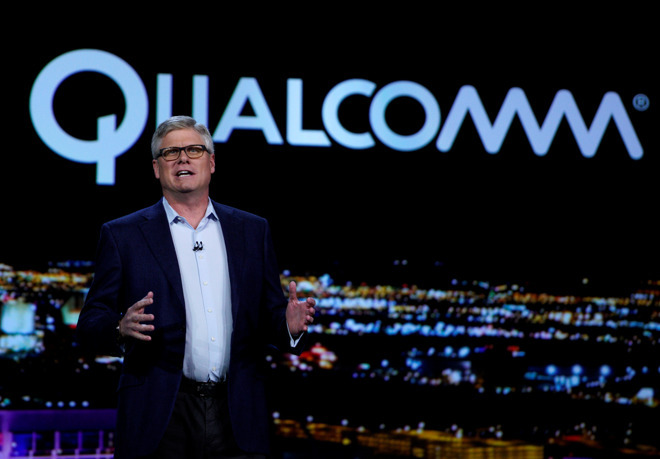Qualcomm has no intention of revealing how much it will benefit from a payment and licensing agreement reached with Apple at the start of a potentially expensive patent licensing trial, CEO Steve Mollenkopf advises, insisting the legal dispute is behind the two companies as they work on new products.
At the start of the high-stakes patent licensing trial on Tuesday, a press release announced ongoing litigation between Qualcomm and Apple would cease with immediate effect. At the same time, the two companies revealed they had reached a six-year licensing agreement enabling Qualcomm to rejoin the iPhone supply chain, and that Apple would pay Qualcomm an undisclosed sum.
Speaking to CNBC on Wednesday, Mollenkopf confirmed the value of the payment agreed with by Apple will remain unannounced. It is likely the amount is sizable, as shortly after the settlement announcement, Qualcomm informed investors it expected incremental earnings per share of $2, increased as a reflection of a ramping up of shipments to Apple, and providing 5G modems to the iPhone producer.
In the time since the settlement, Qualcomm's shares were up more than 15 percent in early-morning trading, after a 23-percent rally on Tuesday just after the deal's announcement.
Mollenkopf expressed pleasure that the ordeal was over and the two firms would work together again. "The reality is two great product companies, it's a natural position for them to work together and want to work together," he insisted.
"The energy of the companies right now is lets figure out how to ramp up as quickly as possible. That's where the focus is, that's what we are excited about" Mollenkopf continued.
The change of heart for the two companies opens up Qualcomm to Apple's modem supply chain, a lucrative source of revenue especially considering the future need for 5G modems, and Intel's announcement it was dropping out of the 5G smartphone modem market. Intel citied "no clear path to profitability and positive returns," with the timing of the settlement likely to have been due to Apple's sudden deal with Qualcomm.
"There's a lot of opportunity for us to go after that and we hope to have the ability to do even more," advised the Qualcomm CEO.
Apple is currently anticipated to start using Qualcomm's 5G modems in iPhones by 2020. Qualcomm's first-generation 5G modem is expected to be used in other smartphones later in 2019.
 Malcolm Owen
Malcolm Owen







-m.jpg)






 Marko Zivkovic
Marko Zivkovic
 Christine McKee
Christine McKee
 Andrew Orr
Andrew Orr
 Andrew O'Hara
Andrew O'Hara
 William Gallagher
William Gallagher

 Mike Wuerthele
Mike Wuerthele
 Bon Adamson
Bon Adamson


-m.jpg)



28 Comments
Must be less than Qualcomm asked for. And probably accepted no double dipping and not charge on the whole value of iPhone. And about Intel's 5G modem development like the pace of it's 10nm chip development schedule, can't compete in fast moving mobile market.
Funny if the deal were: "$1. But Qualcomm gets to make a public statement about Apple making a payment."
Well, there’s a lot to digest. Apple was behind the eight ball because it became clear Intel would not be able to produce a 5G modem and Apple’s in-house plans were years away. Qualcomm was behind the eight ball because they were losing revenue from one of their biggest, if not the biggest, customers. Money talks and bullshit walks. At least we won’t have listen to the whining and carping about from trolls about how much better the Qualcomm modem is than the Intel one.
Apple had no choice. The Intel modems are junk. Look at the XS line. Reception problems. Intel cant make a 5G radio and If Apple were to wait then they will be so far behind the 8 ball they would never catch up.
Apple gets the modems and Qualcomm gets the $$$ both win.
Why are people assuming Apple will use Qualcomm’s 5G modem chip instead of its own 5G modem chip in 2020?
Any one-time payment to Qualcomm could be the $7B Apple and its suppliers didn’t pay for Qualcomm chips vs a down payment for future chips.
A worldwide licensing agreement could be for Qualcomm’s 5G FRAND IP that a US Federal judge said Qualcomm was legally required to do without extra requirements.
A six-year licensing agreement could cover Qualcomm’s 4G/LTE modem chips for older iPhones, iPads, etc. that will remain in production for several more years.
And yes, the ITC could have informed Apple iPhones will have to be blocked from import into the US.